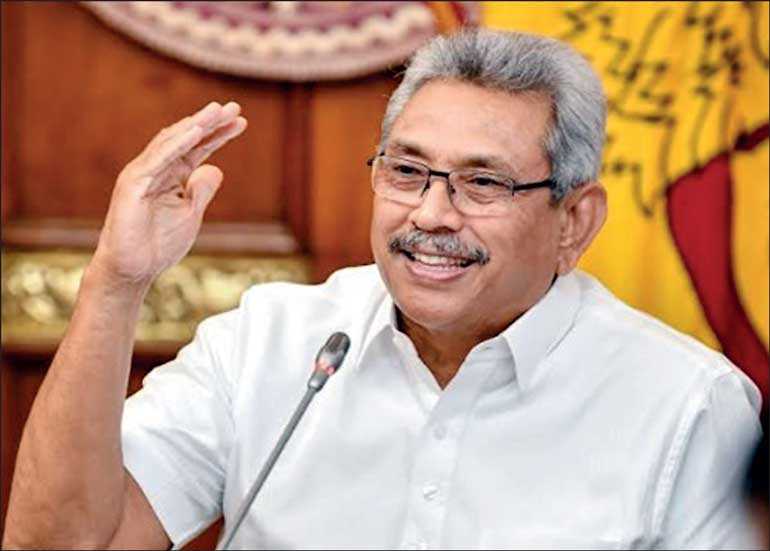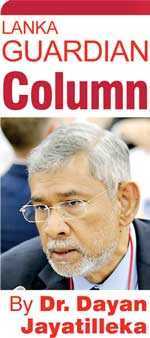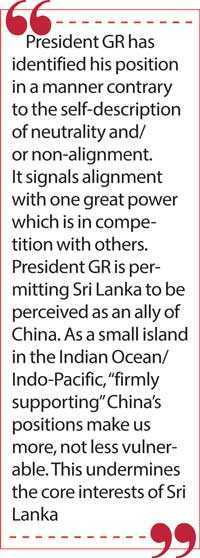Thursday Feb 19, 2026
Thursday Feb 19, 2026
Thursday, 6 May 2021 00:00 - - {{hitsCtrl.values.hits}}

President GR’s regime has compounded its vulnerability by opening three fronts on which it cannot prevail even with China’s ample assistance: The West, India and the Islamic world. Three-and-a half fronts actually, counting Tamil Nadu. Triangulated, cumulative pushback from these sources cannot be overcome by the regime of a small island on the doorstep of one and economically vulnerable to the others.
 I never forgot my teenage immersion in Mao Zedong’s writings. Despite his enormous errors, Mao was the world’s most outstanding philosophical and strategic mind in my lifetime. Deliberating ‘Problems of Strategy in the Anti-Japanese War,’ Mao penetratingly identified and argued that beneath the evident strength and superiority of Japan lay weakness, and beneath the apparent weakness of China lay strength. Time and the maturation of inherent contradictions would turn one into the other.
I never forgot my teenage immersion in Mao Zedong’s writings. Despite his enormous errors, Mao was the world’s most outstanding philosophical and strategic mind in my lifetime. Deliberating ‘Problems of Strategy in the Anti-Japanese War,’ Mao penetratingly identified and argued that beneath the evident strength and superiority of Japan lay weakness, and beneath the apparent weakness of China lay strength. Time and the maturation of inherent contradictions would turn one into the other.
Applying that to the LTTE, I was able to accurately predict its fate in an article published in Colombo’s Sunday papers on 17 October 2004, flaunting a title so categorical about Prabhakaran’s defeat as ‘Why Prabhakaran Will Lose’, at a time when the consensus was that the war was unwinnable by the state and more than a year before Mahinda Rajapaksa was elected President.
The same methodology tells me that President GR’s China-centric gamble will fail, and why.
The Hunger Games
According to a story carried by several mainstream newspapers, “President Gotabaya Rajapaksa, at a discussion held at the Presidential Secretariat Thursday morning (29) said that Sri Lanka would be the first in the world to eliminate the use of chemical fertilisers.” (https://island.lk/president-vows-to-make-country-first-in-world-to-end-use-of-chemical-fertilizers/) That ignores Bhutan, which announced the same goal way back in 2013. Sikkim followed in 2018.
Shouldn’t we ask ourselves why other countries have not tried the same thing? Is it that we are much smarter or more patriotic than anyone else? Shouldn’t we do a comparative study of the top 25 countries with high yields in agriculture and ascertain whether they have a complete ban on chemical fertiliser?
Given the problems we have with chemical fertiliser, have we studied how those problems have been successfully dealt with elsewhere in the world? Has the impact of the shock ban on fertiliser imports on agrarian productivity and food security been calculated? What of the impact of the ban on palm oil on food prices and farmers’ incomes? Gradualism is wiser.
The outlook and approach, methodology and mentality; the very thinking behind the decision-making of the Sri Lankan State and Government—none of these are characterised by enlightened reason and science.
This was true of the UNP too. Paul Krugman, writing in the New York Times, described Professor Joe Stiglitz as “an insanely great economist”. He won the Nobel Prize for Economics. In 2015 Stiglitz was invited to Colombo and shared a panel with Prime Minister Ranil Wickremesinghe. What he said on the occasion was reproduced on his website.
His main contention was that the key to sustainable takeoff in post-conflict Sri Lanka was a policy of equitable growth. He was ignored. The UNP preferred an infinitely less respected and accomplished Venezuelan rightwing neoliberal economist at Harvard, and a Lankan expatriate economist based in the UK and Singapore. The UNP leadership had chugged neoliberal Kool-Aid.
President Gotabaya’s policy of import bans is a throwback to a failed economic model of the Sirimavo Bandaranaike administration that generated the mass economic hardships which threw the SLFP out of office and kept it that way for 17 years. Even the President’s gesture of home-gardening is exactly what Madam Bandaranaike did during her disastrous years of import substitution.
Today, COVID-hit Sri Lanka is showing the lowest economic growth since Independence in 1948. Not every COVID-hit economy has been so badly affected, because it’s not just the COVID, it’s the bad policy framework too. Vietnam has reiterated its commitment to an open economy, and China to globalisation.
What is the likelihood that even with China’s support, an economy which is registering the lowest growth-rate for over seven decades, will bounce back to an extent that livelihoods and living standards are restored to the level that satisfies the electorate by 2024/5?
History has shown that the Sinhala people –unlike the Tamils who took the economic brunt of a long war—are intolerant of economic scarcity and hardship, and will throw overboard any government associated with it.
It is also unlikely that a noticeable percentage of the three minorities—including Sinhala Catholics—are going to vote for this President or Government (even with another sibling as candidate).
The high probability of a Sinhala swing due to economic suffering and the bloc vote of the minorities caused by felt discrimination, points to the administration’s electoral doom. The Rajapaksas are today what the Bandaranaike-Ratwattes were in their heyday. 2019/2020 was 1970, and 2024/5 will be 1977. There will surely be another Rajapaksa President someday, but it will be as in the case of the Bandaranaikes: a considerably long gap, and a President from the next generation, as was Chandrika in 1994.
 China Calculus
China Calculus
It is difficult to imagine that President Gotabaya is ignorant of all these factors. Therefore, he could be counting either on (1) the ability to extend the term of office through Constitutional or extra-Constitutional change (Myanmar) or (2) an external factor, China, to balance off all these negatives. Or both.
As for the new Constitution or an amendment to extend the term of office, he should remember what the same move cost the government of Madam Sirimavo Bandaranaike. The term of office which was to have ended in 1975, was extended to 1977 by reckoning the commencement of the term from the inauguration of the new Republican Constitution. Even after that, several SLFP MPs and Ministers speculated from public platforms that the election should be still further postponed, allowing Madam Bandaranaike to continue leading the country as she had been elected Chairperson of the Nonaligned movement for a three-year term.
If President Gotabaya were to check with ex-Presidents MR and MS, he would be informed that had elections been held on schedule in 1975 instead of being extended via Constitutional chicanery to 1977, the SLFP-led coalition’s support would not have melted-down to the point that the TULF became the largest single Opposition party and Amirthalingam, the Leader of the Opposition.
Had the election not been held, as the nationwide student, railway and general strikes of 1976 showed, the people would have revolted.
All the bets of the Gotabaya camp today are on China (and Israel). President Gotabaya Rajapaksa was a combat officer during the Indian airdrop of 1987, as were many of his inner circle today. They were unable to digest that had the devolution agreements on the table since the Parthasarathy mission of 1983-4 right up to the Chidambaram proposals of December 19th 1986 been legislatively enacted, instead of the filibustering by National Security Minister Athulathmudali that was indulged in, the Sri Lankan government would have been permitted to continue the military operation of 1987 without interruption—just as the IPKF took Jaffna and Delhi permitted President Kumaratunga to retake Jaffna.
President GR and his fellow officers belonged instead to that group in the military which believed that had a more resolute President been in office, and had China been more powerful than it was at the time, India would have been deterred or resisted. Today, they believe that China being a global power on the ascendancy, Sri Lanka under the Chinese strategic umbrella has a credible deterrent against any pressures from India and the West, and is therefore free to exercise absolutist sovereignty (except in the foreign enclaves), while unilaterally changing its political order and facts on the ground in the north and east.
 The Mao the Merrier
The Mao the Merrier
Mao warned the ‘Returned Students Faction’, i.e., the Chinese Communists who had studied in Stalin’s USSR, against adopting a strategic model developed in Russia, in the very different national and social context of China. He insisted on grasping the concrete specificity of every national situation.
Similarly, the durable success of Chinese support in Pakistan, Cambodia and Myanmar must be understood in the dual context of geographic/logistical contiguity and the absence of deep-rooted democratic traditions, unlike in Sri Lanka, an island on India’s doorstep and the oldest electoral democracy in Afro-Asia. The political reordering of semi-democratic Hong Kong is an outlier as it belongs to China.
The failure of President GR’s strategy of the Chinese shield will be overwhelmingly due to him rather than President Xi, but the adventurist errors in the current international line of the Communist Party of China, exemplified by but not limited to the renewed friction with the Philippines and its independent-spirited populist President Duterte, will contribute to that failure.
Mao said that there were three magic wands: The Party, the Army and the United Front. The construction of a United Front, be it global, Greater Eurasian, Eurasian or Asian, presupposes the correct handling of contradictions and the winning over or neutralisation of (vacillatory) intermediate forces. President GR is not doing so domestically or internationally. Nor is his patron, internationally. Zhou Enlai would have managed contradictions with Australia deftly.
In Sri Lanka today, China is potentially faced with the same failure as that repeatedly experienced by the USA and USSR when they open-endedly backed authoritarian regimes stubbornly pursuing policies which were increasingly unpopular in society, combating that unpopularity by doubling-down on repression, and remaining blind to the consequences because they felt insured and insulated by their external backers.
China must or should know better, because it has the benefit of the philosophical wisdom of Mao Zedong who pithily explained the qualitative importance of internal dynamics over external factors by saying that a hen may sit on a stone but will never produce a chicken, but if it sits on an egg, it will. The external factor can act only through the internal one, he said. The Gotabaya regime with its subjectivism and “mountain-top sectarianism” is the stone in that story.
Mao famously minted the phrase ‘Politics in command’ and observed that ‘the correctness or incorrectness of the political line decides everything’. The ‘political line’ of the Gotabaya Presidency is wrong in its very fundamentals. He has conspicuously failed to correctly answer the basic question of political strategy, namely, “Who are our Friends? Who are our Enemies?”
The key to answering that question correctly is, as Mao underscored, the ability to correctly handle contradictions, itself premised on the ability to draw the fundamental distinction between ‘non-antagonistic’ i.e., friendly contradictions on the one hand, and ‘antagonistic contradictions’ on the other.
Mao also emphasised the need to pick out the ‘primary contradiction’ and then to grasp the ‘primary aspect’ of any contradiction. President Gotabaya’s primary contradiction is with COVID-19. The primary aspect of the contradiction is that his model of handling it isn’t working, and his macroeconomic policy is also irrational, thereby threatening economic devastation.
The Left Democratic Front swept the Kerala election and Health Minister Shailaja won her seat by a record majority, thanks to the handling of Covid-19. Kerala is next door but President Gotabaya’s government never thought of tapping its expertise.
President GR’s polarising obduracy is proliferating contradictions all around. This is evidenced in everything from his extended outburst in Ampara on 9 January in which he referred to Opposition MP Harin Fernando and invoked the grotesque end of terrorist chieftain Prabhakaran, to his handling of the Muslims which has just resulted in the Human Rights arm of the Organization of the Islamic Conference (OIC) issuing a blistering critique.
“The Independent Permanent Human Rights Commission of the Organization of Islamic Cooperation has condemned Sri Lankan legislation that allows for the creation of “reintegration centres” as part of a campaign against violent extremist religious ideology. The commission said that the legislation will permit arbitrary detention of Muslims who will be subject to human rights violations without any legal oversight. It also said that a newly imposed ban on the wearing of the burqa, under the pretext of counterterrorism measures, “squarely violates minorities’ rights to freedom of religion guaranteed in the International Covenant on Civil and Political Rights.”
… The commission urged the Sri Lankan Muslim community and human rights organisations to use all available domestic remedies, including domestic courts, to overturn what it described as discriminatory laws.” (OIC panel condemns Sri Lanka ‘reintegration’ plan (arabnews.com – https://www.arabnews.com/node/1852226/saudi-arabia)
The resounding victory in the recently concluded Tamil Nadu state elections of the DMK led by Karunanidhi’s son MK Stalin, with the Congress as junior partner, and the presence of Vaiko in that camp, means that Tamil Nadu, untethered to and unrestrained by the BJP at the centre, will bring pressure to bear on Delhi as regards Sri Lanka. Weakened by the COVID Third Wave, the BJP Government and Prime Minister Modi, are less likely to stand up to the DMK and more likely to accommodate Tamil Nadu vis-a-vis Sri Lanka.
Colombo has deprived Delhi of the ability to resist, by taking a coldly hostile stand towards the 13th Amendment, the very idea of the devolution of power and a political solution to the Tamil question, as well as towards the democratic Tamil parties themselves.
Line of Fire
President GR’s regime has compounded its vulnerability by opening three fronts on which it cannot prevail even with China’s ample assistance: The West, India and the Islamic world. Three-and-a half fronts actually, counting Tamil Nadu. Triangulated, cumulative pushback from these sources cannot be overcome by the regime of a small island on the doorstep of one and economically vulnerable to the others.
A Sri Lankan president is elected to “firmly support” Sri Lanka’s positions based on Sri Lanka’s core interests. His/her mandate is not to “firmly support China’s positions on issues concerning China’s core interests” —as Xinhua quoted President Gotabaya telling Defence Minister Wei—because some of those core interests will be perceived by other countries as running against their own (e.g., in the South China Sea). It is not in our core interests to take sides in such conflicts.
For instance, if we “firmly support” China’s position on issues in the South China Sea which Beijing regards as a core interest while the Philippines has an International Court ruling on its side, on the basis of the UN Law of the Sea Convention (UNCLOS was famously chaired by Sri Lanka’s finest diplomat, Ambassador Shirley Amerasinghe), what happens if and when we have to protect our exclusive economic zone? No Sri Lankan leader must make that kind of total commitment to “firmly support” any other country’s positions and core interests, including those of the USA.
President GR has identified his position in a manner contrary to the self-description of neutrality and/or non-alignment. It signals alignment with one great power which is in competition with others. President GR is permitting Sri Lanka to be perceived as an ally of China. As a small island in the Indian Ocean/Indo-Pacific, “firmly supporting” China’s positions make us more, not less vulnerable. This undermines the core interests of Sri Lanka.
Given our heritage of pluralist democracy, social welfarism and an independent non-bloc foreign policy, Sri Lanka could and should be the New Zealand of South Asia, and its international stance, a version of the values-based, reasoned, balanced perspective of Jacinda Ardern (Speech to China Business Summit | https://www.beehive.govt.nz/speech/speech-china-business-summit).